Fears of civil war in Venezuela as nationwide blackout enters fourth day
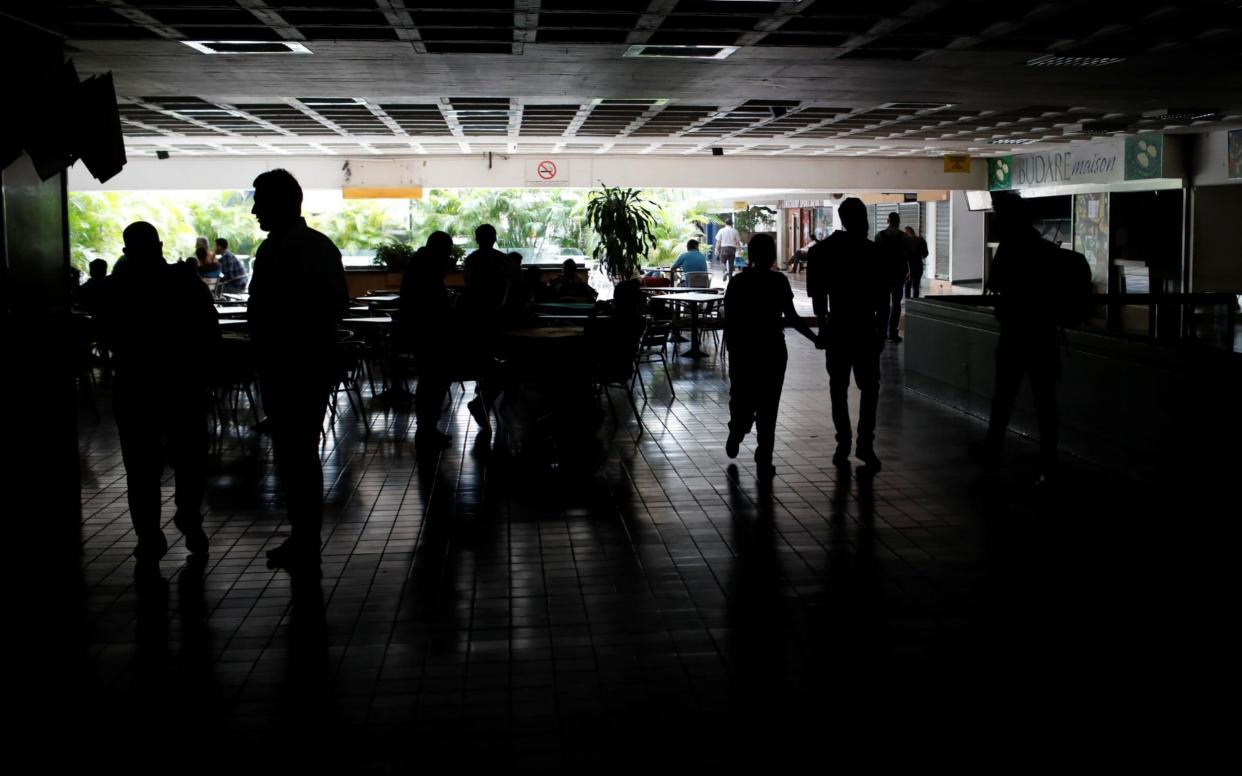
Venezuela is likely heading towards civil war, one of the country’s most respected military analysts has warned.
“I fully expect that Nicolas Maduro’s thugs will come for me tonight, for what I am saying,” said retired colonel Jose Machillanda.
“They have already raided my home, and I know what they are capable of. But this country is in a state of convulsion more serious than anyone realises.”
Juan Guaido, recognised by more than 50 countries as the interim president, on Monday declared a “state of alarm” after four days of nationwide blackout, as the power grid collapsed.
He said that 17 people had died from hospital equipment failing, describing their deaths as “murder” at the hands of Mr Maduro’s government.
Cumpliendo con mis atribuciones constitucionales como Presidente (E), he enviado a la @AsambleaVE la solicitud para que se decrete estado de alarma en todo el territorio nacional debido a la tragedia que vive el país a causa del apagón nacional sostenido. #ANSesiónDeEmergenciapic.twitter.com/et5WjL8uy0
— Juan Guaidó (@jguaido) March 11, 2019
In Caracas, already one of the world’s most dangerous cities, residents were left terrified in the dark at night, as their hard-earnt food supplies rotted in powerless fridges.
Mr Maduro has blamed the largest blackout in Venezuela’s modern history on a cyber attack, orchestrated by the US.
But one 40-year veteran of the Venezuelan state electric company, Corpoelec, told The Telegraph the blackouts were due to a lack of equipment, poor maintenance and staff fleeing the country.
“We used to have the best electrical material available,” he said, attending a pro-Maduro march and only giving a false name, Antonio Canizales.
“We had parts from Switzerland, Germany, the UK, America – the best. Now it’s cheap supplies from China which burn out, or recycled parts from Africa.
“We used to do good projects; now we only patch things up. I think we all look back on when the company was in private hands and think it was a marvellous time.”
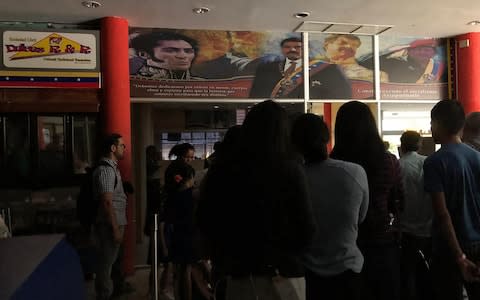
Mr Machillanda said he believes US intervention could come, but not before the country tears itself apart at the seams.
Having served as Hugo Chavez’s military advisor in the early days of his presidency, 20 years later he was asked, earlier this year, to assist Mr Guaido.
He turned the newcomer down, dismissing 35-year-old Mr Guaido in brutal terms as “naïve” and simplistic, lacking the historical perspective to fully comprehend the powerful forces at work.
Mr Guaido and his allies in the US – in particular the Florida senator Marco Rubio and hawkish national security advisor John Bolton – frequently boast about the number of soldiers who have abandoned Mr Maduro: almost 600, according to Colombia’s immigration ministry.
Yet Mr Machillanda laughs when asked about the defections, describing them as low-ranking “drops of water” in a huge military machine 123,000-strong – although he says it is a sign of the disarray inside the ranks.
He insists that Mr Guaido’s attempts to win over the military and get them to turn against Mr Maduro are a waste of time.
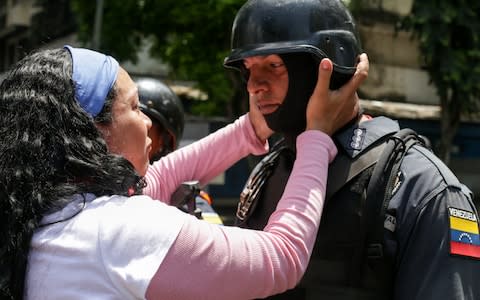
“I still go to the Turkish baths inside Fuerte Tiuna,” he explained, referring to Venezuela’s most important military barracks, where Mr Maduro lives, and where the army headquarters are located.
“I go because, until now, no one has stopped me. And what I hear there disgusts me. The generals in those Turkish baths – they are not soldiers. All they talk about is their business interests: I control a shoe factory, I control a condom factory, I control a clothes factory.
“Do you really think they’ll give that up?”
Venezuela has around 1,200 generals, Mr Machillanda said – a huge number, intended to create conflict between them, he suspected. He is dripping with scorn when asked about their military capacity.
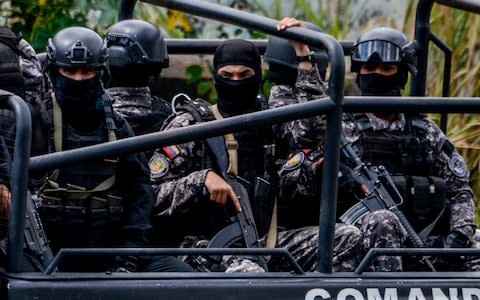
He leaps from his seat, to gesture a series of dumbbell lifts.
“I was doing weights, and one comes up to me and says: ‘I appreciate what you write, and what you say. It’s true. We’re doomed.’ But they still won’t abandon the government because it keeps them afloat.”
Furthermore, the soldiers are terrified of the consequences of rebellion.
Cuban military intelligence has penetrated every level of the Venezuelan armed forces: Mr Machillado says that the Cuban military attache has an office right next door to the Venezuelan defence minister, Vladimir Padrino. Spies within the ranks report on their fellow soldiers, monitoring them for any sign of dissent.
Rocio San Miguel, one of Venezuela’s most shrewd military observers and founder of the Control Ciudano monitoring site, disagreed with Mr Machillando that the desertions were insignificant, saying they were a blow to already battered morale.
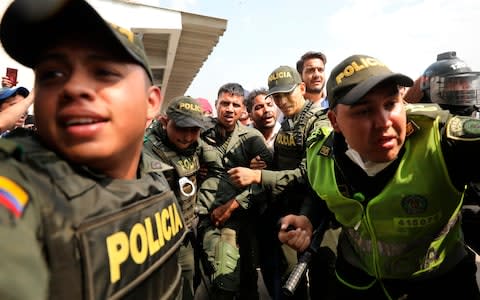
But she agreed that the soldiers were cowed into obedience, noting that the desertions were only from the Colombian border areas – deep inside Venezuela it was impossible to escape.
“How could they do it?” she said. “Within a few minutes you are arrested and tortured. Even worse, your family is hunted down.”
Asked whether she thought more defections were likely, she smiled and would only say: “Every soldier has a plan A, a plan B, and a plan C.”
She added: “Maduro only has the military. He’s lost his political capital, economic capital and social capital. It’s all he has left, and he’s going to do his utmost to cling onto it.”
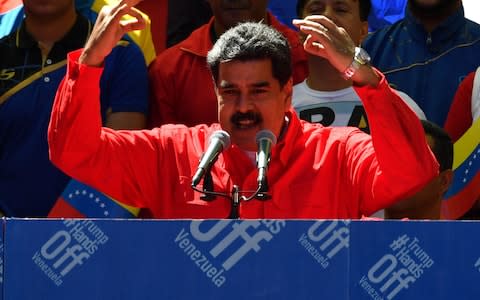
Eudis Luis’s son, Carlos, knows how brutal that repression can be.
A student at the aviation academy, the 27-year-old was on duty on the night of January 2 when weapons were stolen from an armoury, presumably in preparation for an uprising.
Carlos was immediately put into prison and tortured. Mrs Luis said when she saw him a few weeks later, inside the feared Ramon Verde military prison, he could only consume liquefied food through a straw.
Mrs Luis’s house was raided, and her 80-year-old mother beaten. She remains in bed, trying to recover from her injuries.
“I don’t know when he’ll get out,” she said, her eyes filling with tears. “He’s a political prisoner.”
Ms San Miguel, a human rights lawyer, was not surprised by the tale.
“Never before in the history of the Venezuelan armed forces have there been so many members of the military imprisoned, tortured, demoted and expelled, looking to get out, or refugees,” she said.
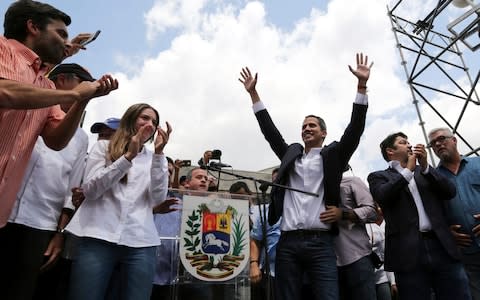
And, with Mr Maduro clinging on, with the commanders of the armed forces remaining loyal out of self-interest and the lower ranks remaining loyal out of fear, Mr Machillando predicts civil war is inevitable. He said it could come in the next few hours, but likely in the coming months.
Ms San Miguel also said she expects the conflict to last for the rest of this year.
She said she wasn’t certain there was a force suitably strong to challenge Mr Maduro’s army, and spark a civil war – although she agreed with Mr Machillando that it was indeed a possibility.
Mr Machillando said his neighbourhood in Caracas, eight months ago, held a meeting about how to protect themselves. They counted 175 firearms among them.
Venezuela has an estimated six million firearms in the country, according to GunPolicy.org – half of them illegally-owned, coming largely from Colombia’s 50-year civil war and through theft from the barracks.
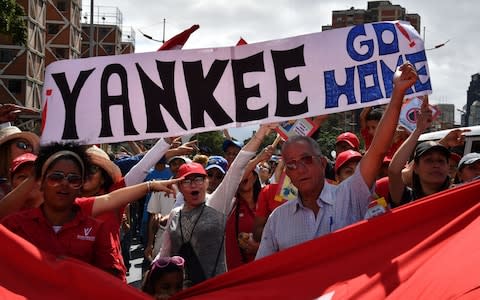
The news website Efecto Cocuyo published at the end of February images of a school in the state of Apure being used by paramilitaries for target practice.
Heavily-armed forces loyal to Mr Maduro, known as colectivos, roam the streets on motorbikes, reportedly at the direction of Diosdado Cabello, the all-powerful and greatly feared head of the pro-Maduro parliament.
The children of both Mr Cabello and of Antonio Benavides Torres, the head of the national guard, are all reported by local media to have left Caracas for Beijing in the last fortnight.
One retired general, who spent 30 years in the Venezuelan forces, stepping down in 2009, told The Telegraph he agreed that civil war was “one of the things that could happen”.
“And we must do everything we can to avoid it,” he said.
He told how, while he was commanding troops, Chavez bought arms from Russia, China and Belarus.
“They’re not the most advanced,” he said. “They certainly aren’t first generation. And some have even fallen into disrepair. But still, there is a lot of hardware there.”
The defence minister, who he knows personally, he described as “a narco-trafficker” who, although lacking in presidential ambitions himself, was now cornered and “in a very dangerous situation”.
Mr Padrino, he said, was ruthless – “he has done whatever necessary to get to where he is,” including bringing in foreign forces: Cubans and Russians, mainly.
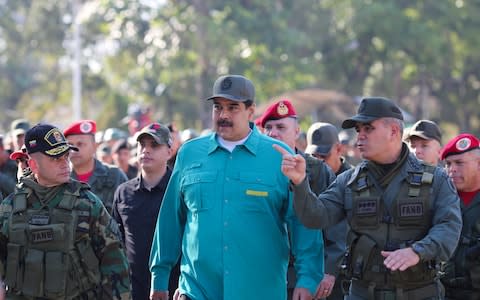
Mr Machillanda said he had been told that there were currently between 120 and 140 Russians based at the military sports and social club – the Circulo Militar - inside the Mamo military base, on the outskirts of Caracas.
“They’ve been there a while sunbathing – many of them speak Spanish now, and eat local food,” he said. “I believe they are mercenaries although I don’t know for sure. I’ve heard there are US special forces about. But British, I don’t think so.”
He sits back in his chair, pondering.
“We need our Winston Churchill right now. But we haven’t got him.”
And he warned that the world was underestimating the gravity of the conflict, and the geopolitical importance of Venezuela – at the crossroads of the Americas, with the US and Cuba both nearby, Israelis involved, particularly interested in the reports of Hizbollah cells on the island of Margarita, and with Russia, China and Iran watching closely.
“Bill Clinton has said, essentially, that the Democrats should back Trump if he decides to go in,” he said. “So you have the whole of the US on side.
“If they go in, it’ll be three days. If the Colombians go in, maybe a week.
“But there will likely be chaos building up to that. Then society will be activated, and the rifles and pistols and automatic weapons will come out.
“We’re heading towards civil war.”

